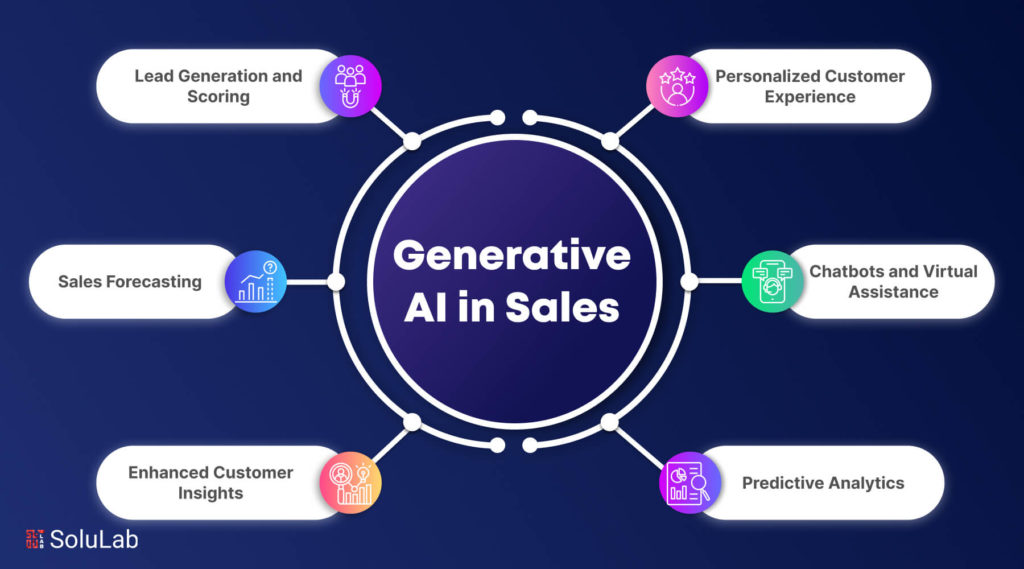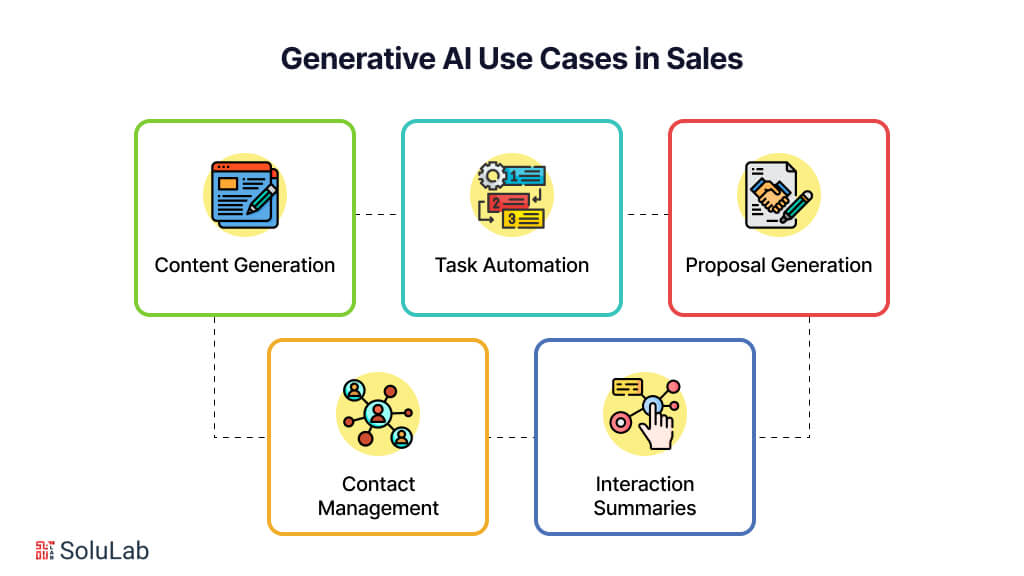
A significant quantity of data is generated by the numerous contacts and transactions that occur in sales, including text from email threads, audio from phone conversations, and video from in-person meetings. Generative AI models are specifically designed to manage these unstructured data sources, which make up around 90% of commercial data. Given sales’ dynamic and adaptable nature, generative AI has a lot of potential to help salespeople assess, comprehend, connect, and tailor customer experiences.
The use of generative AI in sales and marketing is growing. Marketresearch.biz estimated the market for generative AI in sales to be worth USD 310.0 million in 2023. Based on projections, it is expected to reach a staggering USD 850.0 million by 2033, with a compound annual growth rate (CAGR) of 10.9% from 2024 to 2033.
GenAI is very proficient in data analysis, quickly sorting through enormous amounts of data to pinpoint high-potential leads with previously unheard-of precision. In order to maximize efficiency and productivity, this feature guarantees that salespeople may concentrate on the most promising prospects while streamlining the lead-qualifying process. Furthermore, GenAI has a revolutionary effect on sales training. Moreover, Gen AI makes sales interactions more personalized by using data-driven insights to create customized experiences that appeal to certain clients.
Businesses may effectively engage prospects and foster customer loyalty by crafting appealing messaging and offers based on a detailed understanding of their preferences, requirements, and purchase patterns. In this blog, we will explore the function of generative AI in sales, focusing on training, important applications, and sales procedures.
What is Generative AI?
Generative AI, or Generative Adversarial Networks (GANs), is a subtype of artificial intelligence (AI) centered on developing new material or data from existing patterns and instances.
Unlike standard AI models, which are developed for specialized tasks such as categorization or prediction, generative AI seeks to produce innovative outputs that seem like human-created data.
Here’s a far more straightforward explanation:
“Generative AI involves deep-learning algorithms that can produce high-quality text, images, and additional content according to the data they were instructed on.”
The Role of Generative AI in Sales
As reported by McKinsey, around 75% of the benefits of utilizing Generative AI are observed in four major areas:
- Customer Operations
- Marketing & Sales
- Software engineering
- Research and Development (R&D)
Let’s examine the function of generative AI in sales:
As we all know, sales involve many contacts and transactions that generate a great quantity of data, such as audio from phone conversations, text from emails, and video from meetings.
Generative AI is intended to work with this type of data, which accounts for around 90% of company data. The continuously shifting nature of sales provides generative AI with numerous opportunities to evaluate, comprehend, connect, and customize data for improved sales results.
The following data demonstrates how generative AI for sales and marketing is used:
- About 70% of businesses that use AI in their operations report more marketing and sales revenue as a result of the technology.
- According to research by McKinsey, the percentage of businesses utilizing AI has grown since 2017 and currently stands between 50% and 60%.
- Salesforce discovered that, in contrast to 51% of marketers, just 33% of salespeople utilize or intend to employ generative AI.
- According to Gartner, generative AI will handle 60% of salespeople’ responsibilities in the next five years, up from less than 5% in 2023.
- RFP Genie is a tool developed by Twilio that scans files for pertinent information in a Request for Proposal (RFP) and then generates answers using generative AI (similar to OpenAI’s GPT-4).
- Google anticipates saving tens of thousands of hours annually for its sales staff thanks to its AI RFP tool.
- Sixty-one percent of sales professionals think technology will increase sales and enhance customer service.
In accordance with a HubSpot study of more than 1,350 sales executives:
- 74% make use of automation or AI technologies.
- AI and automation are deemed significant for sales strategy by 60% of respondents.
- 69% of respondents think automation and AI can be helpful in locating new clients.
How to Use AI in Sales?
Artificial intelligence (AI) is transforming sales, offering new ways to boost productivity, enhance customer engagement, and drive revenue growth. Here’s how you can effectively start using AI for sales strategies:
1. Lead Generation and Scoring
Artificial intelligence in sales and marketing can significantly improve lead generation by analyzing large amounts of data to identify potential customers. AI-powered tools can assess the likelihood of leads converting into customers based on their past behaviors, interactions, and demographic information. This process, known as lead scoring, allows sales teams to prioritize high-value prospects and tailor their approach accordingly.
2. Personalized Customer Experiences
Generative AI in marketing and sales can create highly personalized content and communication strategies. By analyzing customer data, AI can generate customized emails, social media posts, and product recommendations that align with individual preferences and behaviors. This level of personalization helps build stronger relationships and increases the chances of closing sales.
3. Sales Forecasting
Accurate sales forecasting is crucial for planning and strategy. AI in sales enablement can analyze historical sales data, market trends, and economic indicators to predict future sales performance. This allows sales teams to make informed decisions, allocate resources effectively, and set realistic targets.
4. Chatbots and Virtual Assistants
AI-powered chatbots and virtual assistants can handle routine inquiries, provide instant responses to customer queries, and guide potential customers through the sales funnel. These tools are available 24/7, ensuring that customer interactions are efficient and consistent, ultimately freeing up sales representatives to focus on more complex tasks.
5. Enhanced Customer Insights
AI in sales and marketing can provide deeper insights into customer behavior and preferences. By analyzing data from various touchpoints, AI helps sales teams understand customer needs better and tailor their strategies accordingly. This leads to more effective communication and higher conversion rates.
6. Predictive Analytics
AI B2B sales tools can use predictive analytics to identify the best times to contact prospects, suggest optimal pricing strategies, and recommend upsell and cross-sell opportunities. By leveraging these insights, sales teams can improve their chances of closing deals and maximizing revenue.
By integrating AI for sales processes, you can unlock new levels of efficiency and effectiveness, ultimately driving better results for your business.
Benefits of Generative AI in Sales
The benefits when implementing generative AI in sales are as follows:
- Better Lead Generation: By analyzing customer data, generative AI for sales may more precisely identify potential leads, increasing conversion rates.
- Personalized Customer Interactions: Sales teams may improve engagement and forge closer bonds with customers by creating customized messages and content that are based on their preferences.
- Effective Sales Processes: By automating time-consuming chores like creating proposals or emails, sales representatives may concentrate on higher-value duties.
- Improved Sales Forecasting: By analyzing past sales data and industry trends, generative AI for sales may produce more precise sales predictions that support strategic decision-making.
- Cost Reduction: Generative AI lowers operational expenses related to sales operations by optimizing workflows and enhancing productivity.
- Real-time Sales Support: AI-driven technologies may help sales representatives in real-time during client contacts, boosting productivity and closing rates.
- Competitive Edge: By providing data-driven insights and more intelligent sales methods, leveraging innovative AI technologies provides firms with a competitive edge.
Generative AI Use Cases in Sales

Generative AI applications in Sales are rapidly transforming the industry, offering numerous advantages that streamline processes and enhance outcomes. According to a HubSpot survey, the top uses of sales AI include content generation (18%), reaching out to potential prospects (16%), and analyzing data and research (16%). Here are 14 practical generative AI use cases in sales, categorized into content generation, task automation, and data analysis.
1. Content Generation
- Personalized Email Writing Generative AI tools enable sales teams to craft personalized emails efficiently. Using CRM data, such as customer names and past interactions, these tools create emails tailored to individual needs and interests. They also gather information from sources like LinkedIn or company websites to identify common connections or shared experiences with outbound leads, generating emails that help establish rapport with new prospects. Sales representatives access these tools through a chat interface within their email system, which suggests responses for each email and allows users to input specific requests. Users can then edit the generated draft as needed.
- Writing Effective Sales Pitches Generative AI for sales assists in creating effective sales pitches by generating tailored content based on customer data and market insights. Sales teams can craft compelling pitches that resonate with specific audiences, incorporating personalized messaging and persuasive language. This technology enables sales representatives to deliver impactful presentations that address customer needs and preferences, increasing the effectiveness of their sales efforts.
- Designing Sales Proposal Slides Generative AI tools help sales teams create visually appealing presentation slides, which is valuable since not all sales representatives have design expertise. Using natural language, sales reps can instruct the AI tool to create slide decks and other visual content. For example, a sales rep could request: “Generate a sales proposal for a B2B tech company.” The tool would then produce slides with essential sales elements like an “about us” section, charts, and customer testimonials, which the sales rep can customize with specific company information.
- Improving Sales Chatbots Generative AI for sales improves customer-facing chatbots by enhancing their ability to process natural language. Advanced capabilities allow chatbots to understand complex queries and respond in a more human-like way, making them more helpful and engaging.
2. Task Automation
Lead Research Generative AI tools assist sales reps in researching leads within their CRM systems. For example, a sales representative at a technology startup in San Francisco could ask the AI tool to generate a list of top software development firms in the Bay Area. The tool compiles detailed profiles of these companies, including services offered, key contacts, and office locations. The sales rep can then import this information directly into the CRM system for future outreach and relationship building.
3. Proposal Generation
Generative AI marketing can aid sales teams in crafting proposals by generating customized content tailored to customer preferences and business insights. Sales representatives can input specific details about a client’s needs, such as industry, project scope, and desired outcomes. The AI tool then generates a comprehensive proposal document, including relevant information, pricing details, and value propositions customized to the client’s requirements. This streamlines the proposal creation process, ensuring consistency and accuracy in presenting sales offers to potential customers.
4. Contact Management
Generative AI can simplify CRM data entry for sales representatives, saving time in large enterprises with complex sales processes. Sales reps can use natural language prompts to efficiently input contact information. For instance, typing “schedule a demo with Acme Corporation for next Tuesday at 10 AM” would automatically create a calendar event and update the CRM with the scheduled demo details, including contact information and meeting notes.
5. Interaction Summaries
Generative AI can summarize recorded interactions from calls, emails, and video chats, helping sales reps easily review important details. These tools automatically add interaction highlights as notes in the CRM system, saving sales reps time.
- Lead Scoring: Sales teams often manage numerous leads, especially in large organizations. Generative AI tools can quickly analyze vast customer data to enhance lead scoring and guide sales reps on which prospects to prioritize. These tools assess various customer data points, such as demographics (age, gender), website interactions, firmographics (company size, industry), purchase history, job title, and social media engagement. By synthesizing this data, generative AI assigns scores to each lead, updating them in real-time as new information is processed, helping sales reps focus on the most promising prospects.
6. Real-time Sales Coaching
Generative AI tools can provide real-time coaching to sales reps by analyzing their interactions, such as emails, live chats, and video conferences. Organizations can customize their AI tools by feeding them large amounts of past sales interaction data. For example, if a customer asks about pricing, the AI tool can generate a cue card with effective responses based on successful past interactions. This assists sales reps in confidently and accurately addressing customer inquiries. Additionally, generative AI can identify ineffective behaviors, such as overselling during initial discussions, and highlight patterns leading to unsuccessful outcomes. This feedback empowers sales reps to refine their approach by emphasizing understanding customer needs before pitching product features.
7. Accurate Forecasting
Generative AI’s capability to analyze large volumes of unstructured data, such as sales interactions, can significantly improve forecast accuracy. For example, if a sales forecast predicts a surge in demand for a specific product line, the organization can ramp up inventory and allocate resources to meet anticipated customer needs. Conversely, inaccurate forecasts can result in excess inventory or shortages, impacting profitability and customer satisfaction. Generative AI tools analyze historical sales data, market trends, and customer preferences to predict demand more accurately.
8. Sales Analytics
Generative AI revolutionizes sales analytics by providing critical insights for informed decision-making and strategy refinement. It analyzes sales data to uncover patterns, trends, and key performance indicators, utilizing machine learning to predict future sales performance. Moreover, AI offers prescriptive analytics by providing actionable recommendations to enhance sales outcomes. Real-time analytics, sentiment analysis, pipeline assessment, and sales rep performance evaluation are among the areas where generative AI can empower sales teams with valuable insights.
9. Sentiment Analysis
Generative AI can evaluate customer feedback, reviews, and social media comments to assess sentiment and uncover potential insights. This enables sales teams to address customer concerns, leverage positive feedback, and refine sales messaging to better connect with their target audience.
10. Improve Reporting System
Sales managers can use AI tools to analyze their team’s recent sales data and identify salespeople who may need additional support. AI tools can detect individuals experiencing a decline in performance and create personalized reports highlighting individual strengths and weaknesses, along with recommendations for improving performance.
Related: Generative AI in Customer Service
What is the Role of Generative AI in Sales Training?
In the highly competitive corporate environment, sales teams are always looking for methods to enhance their performance and produce outcomes. By utilizing generative AI in sales, companies may revolutionize their sales training initiatives by providing customized and interactive learning opportunities adapted to every sales professional’s specific requirements. Here’s more information about how generative AI supports sales training:
- Evaluation of Needs and Customization: GenAI begins by examining the performance information of individual sales agents, such as their sales numbers, contacts with customers, and any comments they may have gotten. Through an awareness of each representative’s areas of strength and growth, GenAI is able to customize the training curriculum to meet individual needs. By ensuring that the training materials are powerful and relevant for every sales professional, this customization maximizes the efficacy of the program.
- Simulation and Role-playing: GenAI generates engaging role-playing games and realistic sales situations for sales professionals to participate in. These hypothetical instances are drawn from actual events that salespeople deal with on a daily basis with clients. Sales professionals may practice implementing new tactics and strategies in a secure and controlled environment by using simulators. This practical technique helps sales professionals succeed in real-world sales scenarios by reinforcing learning and boosting confidence.
- Feedback and Coaching: During training sessions, GenAI gives salespersons immediate feedback and coaching. GenAI can assess sales professionals’ performance in real-time using data analytics and provide tailored feedback on their areas of strength and growth. This feedback is helpful to each sales professional since it is precise, actionable, and catered to their requirements.
- Resources for On-Demand Learning: A variety of materials, such as articles, videos, and interactive modules, are available through GenAI. Sales reps have the option to study at their own speed, examining subjects that pique their interest and expanding their expertise whenever it suits them. Because of this flexibility, salespersons may take charge of their education and choose the materials that best suit their interests and requirements.
- Adaptive Learning Paths: GenAI dynamically modifies the course material in accordance with the learning curve and progress of sales agents. Through the performance and engagement monitoring of sales agents, Gen is able to pinpoint areas that may require more help and provide focused interventions in response. By refining the learning process for every sales representative and enhancing the program’s overall impact, this adaptive method guarantees that training stays applicable and efficient.
Generative AI vs. Traditional Sales Tools
| Aspect | Generative AI | Traditional Sales Tools |
| Creativity | Produces fresh content and concepts based on input data and detected patterns | Depends on fixed templates and predefined strategies |
| Customization | Delivers tailored recommendations and responses specific to individual needs | Provides generic solutions and responses |
| Automation | Automates the creation of content and customer interactions, minimizing manual effort | Typically requires manual input and handling for each interaction |
| Learning Capability | Continuously improves and learns over time through data analysis and feedback | Has limited ability to adapt or improve without human intervention |
| Scalability | Easily scales to manage large amounts of data and interactions | May have difficulty managing increased workload without extra resources |
| Flexibility | Rapidly adjusts to changing market trends and customer preferences | Usually less flexible and requires significant reconfiguration to adapt |
| Insight Generation | Generates insights and analytics from data patterns and customer interactions | Provides basic reporting and analytical capabilities |
| Integration | Seamlessly integrates with existing systems and workflows | Integration might require significant customization and development |
| Cost-effectiveness | Can reduce costs through automation and enhanced efficiency | Initial costs might be higher, with the potential for long-term benefits |
| Innovation | Promotes innovation by creating new ideas and approaches | Relies on traditional methods and established techniques |
Best Practices for Implementing Generative AI in Sales
Implementing generative AI in sales requires thoughtful planning and adherence to best practices to ensure optimal effectiveness. Here’s a comprehensive breakdown of the key steps:
1. Select the Appropriate Tools: Carefully evaluate and choose generative AI tools that seamlessly integrate with your existing sales workflows. Opt for platforms that align with your specific processes to maximize productivity gains and return on investment.
2. Focus on Quality: While automation is beneficial for scaling operations, it’s crucial to prioritize quality over quantity in content generation. Ensure that AI-generated content meets high standards to maintain your brand’s reputation. Generic or irrelevant content can damage customer trust and credibility.
3. Ensure Data Accuracy: Regularly update and manage your prospect data to ensure that AI generates personalized content using accurate and relevant information. Clean and current data sets are vital for delivering tailored and impactful messaging.
4. Monitor and Analyze Performance: Leverage the analytics features of generative AI platforms to track the performance of generated content. Monitor metrics such as engagement rates, conversion rates, and customer feedback to gauge effectiveness. Use these insights to identify trends, preferences, and areas for improvement, and adjust your approach and content strategies based on data-driven findings.
By following these best practices, businesses can effectively use AI for sales and AI-powered marketing, driving efficiency, personalization, and success in customer engagement and conversion.
Final Words
Generative AI holds transformative potential for businesses in sales, offering a range of benefits from automating content creation to providing personalized customer interactions. By leveraging generative AI, companies can enhance their efficiency, improve lead scoring, generate insightful analytics, and deliver customized proposals, ultimately driving higher engagement and conversion rates. Implementing these AI-driven solutions not only streamlines sales processes but also enables businesses to stay competitive in the sales market.
However, integrating generative AI into sales operations comes with its challenges, including data quality management, ensuring content relevance, and maintaining system integration. SoluLab, as a leading Generative AI development company, specializes in addressing these challenges by offering tailored AI solutions that seamlessly integrate with existing workflows. SoluLab ensures that data is accurately managed and that AI-generated content aligns with your brand’s standards. To learn more about how SoluLab can help your business effectively implement generative AI in sales, contact us today.
FAQs
1. What is generative AI and how can it benefit my sales team?
Generative AI refers to artificial intelligence systems that can create content, such as text, images, or even entire proposals, based on input data and learned patterns. For sales teams, generative AI can automate the creation of personalized content, improve lead scoring, provide real-time coaching, and generate insightful analytics, thereby increasing efficiency and effectiveness in customer interactions and sales strategies.
2. How does generative AI ensure the quality and relevance of the content it produces?
Generative AI systems are designed to learn from large datasets, including past sales interactions, customer feedback, and market trends. This learning process enables them to generate content that is highly relevant and tailored to specific customer needs. Additionally, ongoing monitoring and fine-tuning of the AI models help maintain high standards of quality and relevance.
3. What are the key steps to successfully implementing generative AI in my sales processes?
Successful implementation involves several key steps: selecting the right AI tools that integrate well with your existing sales workflows, prioritizing quality over quantity in generated content, maintaining accurate and up-to-date prospect data, and regularly monitoring and analyzing the performance of AI-generated content to make data-driven improvements.
4. What challenges might my business face when integrating generative AI into sales, and how can they be overcome?
Common challenges include managing data quality, ensuring the relevance and quality of AI-generated content, and integrating AI systems with existing workflows. These challenges can be overcome by partnering with an experienced AI development company like SoluLab, which offers tailored solutions to ensure seamless integration, accurate data management, and high-quality content generation.
5. How can SoluLab help my business implement generative AI for sales effectively?
SoluLab specializes in developing and integrating AI solutions tailored to your specific business needs. They address key challenges such as data quality management, system integration, and content relevance, ensuring that your generative AI implementation is smooth and effective. To explore how SoluLab can assist your business in leveraging generative AI for sales, contact them today.






